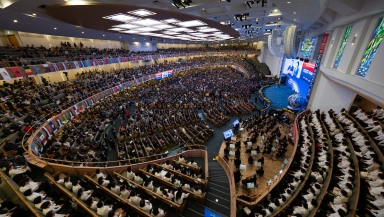
Evangelicalism is growing around the world but nowhere more so than in Africa where the increase has been “explosive”, says researcher Jason Mandryk.
By contrast, growth in Western nations remains “modest”, he told the World Evangelical Alliance (WEA) on the first day of its World General Assembly taking place in Seoul this week.
In a detailed presentation tracking growth, delegates heard how in 1960, evangelicals accounted for only 8% of the global body of Christ. Today it stands at over 25%, said Mandryk, a Christian researcher with Operation World. The total number of evangelicals worldwide, he estimates, sits between 600 million and 650 million.
“We are many …, we are increasing,” he said, explaining that the growth is down to a combination of factors, including natural reproduction, evangelism, and the “evangelicalisation” of Christians who were not previously evangelical.
Around 70% of Christians in general, many of them evangelicals, live in Africa, Asia and Latin America, he said. In Africa specifically, this growth has gone hand in hand with “rapid urbanisation”, with many rural Christians migrating to cities.
So long as evangelicals continue to prioritise family and the proclamation of the Gospel, he expects this growth to continue.
Describing evangelical churches in Africa as “vibrant” and “quickly growing”, Mandryk said nearly 70% of all Christian growth around the world was occurring in Africa alone and that the growth rates on the continent were “astonishing”.
In some ways, this is “not new” as the shift in global Christianity away from its traditional strongholds in the West has been in evidence since 1980 - a year he described as “a tipping point”.
“The future of Christianity is already here and it has already been here for 45 years. This is not new news,” he said.
“The notion of Christianity and Evangelicalism as the white man’s religion is rapidly shrinking in the rearview mirror.”
This raises some questions for evangelicals, he said, specifically “whether evangelicalism looks and acts and is led by the demographic realities on the ground or led by the vestiges of the past”.
What this rapid growth also means is that “discipleship has to be amongst our very top priorities” alongside pastoral training and leadership development.
Elsewhere, Mandryk addressed the lack of agreement over what the term ‘evangelical’ means - something that has been long debated within the movement. In addition to “a dizzy array of definitions”, the term ‘evangelical’ is sometimes being used “unfairly, inaccurately, even harmfully”, he said.
“There are many tribes of evangelicals, many points of contention regarding what our priorities should be and therefore it becomes necessary to acknowledge there is no one single definition to rule them all. It means different things to different people. And even being evangelical means different things to different evangelicals,” he said.
“And apart from jettisoning this term entirely, which I don't think the WEA is very likely to do, we're going to have to operate in this reality that there is not a single understanding of what it means to be an evangelical.”
What is important, he believes, is for evangelicals to explain their beliefs “with clarity and confidence to others” although this has not been made easier by the succession of “scandals” that have affected the evangelical community in recent years, he said.
“Sadly, we must also recognize that we are as evangelicals compromised. And this is not even solely or primarily because that word evangelical has been co-opted by political agendas. It's because we have failed to live up to the gospel that we preach. We've often presented a poor testimony to a leading world,” he said.
“And as scandals continue to come to light within the Christian faith, our reputation has gone in some parts from being well-regarded as good people to the term evangelical, becoming one of derision almost synonymous with words like hypocritical, bigoted, and hateful.”
Despite this, evangelicalism worldwide has been doing a “good job” of retaining the next generation, particularly in Africa where many young evangelicals continue into adulthood with the evangelical faith they were raised in by their parents.
Joining Mr Mandryk on the panel was Dr David Tarus, of the Association of Evangelicals in Africa, who said that as the Church continues to grow on the African continent, there is an urgent need to increase access to quality theological education and training for pastors.
An indication of the scale of the challenge, Dr Tarus said that research by his organisation put the proportion of African pastors without any formal theological training at 90 per cent, while 79.5% do not have a Bachelor’s degree or equivalent. A majority (87.9%) said that financial lack was a barrier to formal training, while over a quarter (27.4%) said that time constraints were an issue.
He said it was “no wonder” that African Christianity was being confronted with challenges like syncretism, the prosperity gospel, and divisions, and that it was “critical” that the Church think afresh about how it could help more African Christians access formal theological training.
The Church, he cautioned, should “not wait for people to come to our institutions for training, but take theological education to the local church and communities”.
Some work is already being done to offer informal training options alongside formal degrees which, at four years long, are quite challenging for many pastors to commit to and therefore “not able to meet the need of the growing Church” in Africa.
He gave the example of his own father who had planted many churches despite never having a formal theological education. What he did have was informal training by Christians from such institutions who went out into the villages and taught “under the trees”.
“We need to begin imagining ways of developing such kind of leaders because those are the kind of leaders that the Church depends on,” he said.













